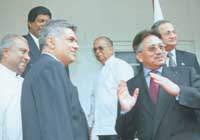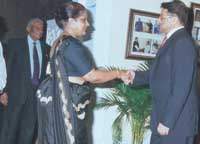| News |
||||||
|
Musharraf: the
man and his mission
Bismillahirrahmanirraheem,
in the name of Allah, most gracious and most merciful and with this
opening verse from the Quran, he began his news conference. The preamble
to the news conference took less than a minute yet it brought out
the man within and offered an insight on his vision for his country.
This is not an attempt to psychoanalyze the visiting dignitary but
I believed he has the vision and the capability to lead Pakistan
out of a political, economic and social mess. "I have
a role to play," Gen. Musharraf declared when asked whether
he would bow out of politics after the October parliamentary elections.
"I want to usher in real democracy to Pakistan - a functional
democracy, a democracy that has been tailored to fit Pakistan and
its needs," he said, indicating that his version of democracy
need not be the same as what is practised in the western world or
in India. In that task,
he is appears to be determined to succeed where his predecessors
have failed. He says his task is to build a modern nation but it
is not going to be another Turkey where in 1924 Mustafa Kemal, who
like Musharraf was a military general, took over leadership and
established the modern Turkey, radically transforming the Turkish
society, politics and law and imposing Western standards of dress,
the Latin alphabet and secularism. Gen. Musharraf
is apparently trying to modernize Pakistan while preserving its
Islamic identity. Spelling out
the objectives of the proposed reforms, which have come under fire
from political circles in Pakistan, the 59-year-old war veteran
said political restructuring, economic revival, poverty alleviation
and good governance were the salient features of a silent revolution
that was transforming his country under his stewardship. But his critics
say that behind these reforms were a move to consolidate power and
it would be the President, who got a five year democratic sanction
for his rule in a questionable referendum in April, and not parliament
that would be taking decisions. They say that
if his proposed constitutional reforms are implemented, he will
be able to change the prime minister, dissolve parliament and hold
the power to appoint senior judges and top officials. Besides, the
proposed National Security Council will be a front for the military
to have its control over the civilian administration. Rejecting such
criticism, Gen. Musharraf said, "I am a military man and I
believe in the unity of command and that unity of command after
October 10 will be centred on the prime minister who will take the
decisions with regard to governance." Explaining
his post October 10 role, Gen. Musharraf said he would only act
as a check to ensure that Pakistan's national interest was not compromised
and good governance was established. The general's
vision appears to be another phase of the Pakistani military rulers'
experiment with democracy. In the 1950s, Gen. Ayub Khan introduced
his 'basic democracy' which gave him all the room to wield his powers.
In the 1970s, Gen. Zia-ul Haq introduced partyless democracy and
legitimised his rule in a referendum that linked the Islamisation
process with the continuation of his rule. Now Gen. Musharraf comes
out with his version of democracy. But an important
difference this time is an indication that Gen. Musharraf wants
to put an end to military dictatorships. Towards this
end, he is trying to introduce a national security council. His
critics see this as an attempt to legitimise the role of the military
in governance. Gen. Musharraf
does not disagree. "To exclude them (military), we have to
include them in the system," he said adding that it was unfortunate
that the military had been drawn into politics. The National
Security Council comprising the President, the Prime Minister, the
opposition leader, the joint military chief of staff and the commanders
of the armed forces would only be a consultative body which would
not challenge the supremacy of parliament. But it would advise the
President on the dissolution of parliament or the sacking of the
government if it felt that such an action was necessary to safeguard
Pakistan's national interest, the visiting President said. Though Gen.
Musharraf got a 97 percent approval in the referendum than had less
than ten percent turnout, most people welcomed the military coup
that gained its legitimacy on a platform of corruption-busting. Even his critics
acknowledge his success in fighting corruption and Gen. Musharraf
told the Colombo news conference that the main corruption-fighting
body, appropriately named National Accountability Bureau (NAB) had
so far retrieved more than US$ 2 billion which had been defrauded
and that more than 300 top officials and politicians had been jailed
on corruption charges. His message
to the self-exiled Benazir Bhutto, two-time prime minister of Pakistan,
was that she would have to face justice and serve the jail term
as she had been convicted and sentenced by courts. Gen. Musharraf
was in Sri Lanka, leading a high-level government and business delegation.
His mission here was to cement Sri Lanka-Pakistan ties through enhanced
socio-economic and political cooperation. Three agreements on tourism
and archaeology; culture and technology; and free trade were signed
on Thursday at Temple Trees. Besides these
agreements, the visit was seen as a diplomatic triumph, something
that could not be said about his visit to Bangladesh, the first
leg of his whirlwind tour of Asia. Mr. Musharraf is now visiting
China, a close ally of Pakistan. In Sri Lanka,
he threw his country's full weight behind the peace process and
said he prayed and hoped that the peace initiative of the government
would lead to a permanent peace. He said Pakistan
would continue to give moral, diplomatic and material support to
Sri Lanka in its efforts to realise peace and safeguard its sovereignty
and territorial integrity. "Pakistan is with Sri Lanka all
the way," he declared in a pledge that hit national headlines. A veteran military
strategist himself, the Pakistani leader paid a glowing tribute
to the Sri Lankan armed forces, saying that it was remarkable that
they defended the territorial integrity of the country throughout
the 20-year war. Talking on
military cooperation, General Musharraf said that Pakistan had trained
more than 1,000 Sri Lankan military officers and would continue
the process. He also assured that all what Pakistan had in military
material was available to Sri Lanka, a country with which he is
emotionally linked. It was on a return trip from Sri Lanka in October
1999 that he staged the military coup against Prime Minister Nawaz
Sharif who tried to prevent the plane that carried Gen. Musharraf
from landing in Karachi. Some observers
said Gen. Musharraf's Sri Lanka visit was aimed at showing India
that Pakistan also had friends in the region. Gen. Musharraf dismissed
this saying his visit was not aimed at "showing anything to
anybody." The friendly
words he had for Sri Lanka were missing when he made direct or indirect
references to India during the news conference. He accused
India, without naming it, of trying to stifle the progress of the
South Asian Association for Regional Cooperation. He said the SAARC
charter should be amended to allow the annual summit to take place
even if one member-state did not or could not attend. Obviously,
it was a reference to India which refused to attend the Katmandu
summit in 1999 and 2000 ostensibly in protest against the military
coup, though observers said it was due to strained relationship
between the two South Asian neighbours. Relations between
India and Pakistan have been strained since the Kargil crisis in
1998 when intruders from Pakistan occupied the Kargil sector in
the Indian-held Kashmir. When tensions
increased during the Kargil crisis, the man who was keeping the
finger on the nuclear button was Gen. Musharraf while Prime Minister
Sharif was in Washington pleading with President Bill Clinton to
work out a face-saving exit for Pakistan from the Kargil quagmire.
Displaying
both the hawk and the dove in him, Gen. Musharraf hit out at India
for not being realistic on the Kashmiri issue. He accused
the Vajpayee government of being hypocritical and juggling with
words in dismissing international calls for an early end to the
Kashmiri crisis. His comments
on Kashmir and the attacks on India came days after US Secretary
of State Colin Powell caused an uproar in New Delhi by saying Kashmir
was now on the international agenda. "India
cannot deny that Kashmir is an international issue. It is a flashpoint
because both India and Pakistan have become nuclear powers. India
should understand these realities," Gen. Musharraf said. For decades
India has been insisting that Kashmir is an integral part of it
and an internal problem, thereby strongly rejecting any international
or third party mediation while Pakistan has been pushing for internataional
mediation and India's compliance with the 1948 UN resolutions that
called for a plebiscite in Kashmir. Gen. Musharraf
said he regretted that despite a flurry of international diplomatic
activity in recent months, the relationship between India and Pakistan
was at its lowest ebb. He reiterated
that Pakistan did not want war and would not initiate war with India,
his country of birth, which his family abandoned in favour of Pakistan
in 1947. But he warned India again that Pakistan could not and would
not remain passive if its dignity and honour were challenged. Gen. Musharraf
joined the Pakistani army in 1964 and trained as a commando at the
military academy of Kakul. He was awarded a medal for gallantry
during Pakistan's 1965 war with India, and served as a commando
in the war with India in 1971 - the last time the two countries
engaged in direct battles. Calling for immediate measures towards de-escalation of tensions, Gen. Musharraf said de-escalation should not be an end in itself. It should lead to a dialogue between the two countries and a solution for the Kashmir crisis. Commenting on
the vital question of terrorism, Gen. Musharraf said there was vicious
propaganda against Pakistan and Islam, obviously another swipe at
India which accuses Islamabad of encouraging cross-border terrorism
of Kashmiri militants. He said suicide bomb attacks and similar acts were linked mainly to political disputes, making it clear that Islam had no connection with terrorism. Pak minister
here again next month Pakistan's Commerce Minister will be here
again next month to finalise certain areas in the Free Trade Agreement
signed last week, his Sri Lankan counterpart Ravi Karunanayake said. Several areas
including the negative list of items and concessions would be finalised
at the meeting with Pakistan Commerce Minister Abdul Razzak Dawood
who was on Pakistan President Pervez Musharraf's delegation to Sri
Lanka this week. Mr. Karunanayake signed a framework treaty on the FTA with Mr. Dawood on Thursday. The treaty, expected to provide a boost to bilateral trade and economic cooperation, would be ratified by both the countries before the end of the year. The agreement would enhance opportunities for joint ventures and additional foreign direct investment from Pakistan to Sri Lanka. The apparel industry in Sri Lanka in particular would also benefit immensely besides other areas such as engineering, tea and electronics, Mr. Karunanayake said. |
||||||
Copyright © 2001 Wijeya Newspapers
Ltd. All rights reserved. |


